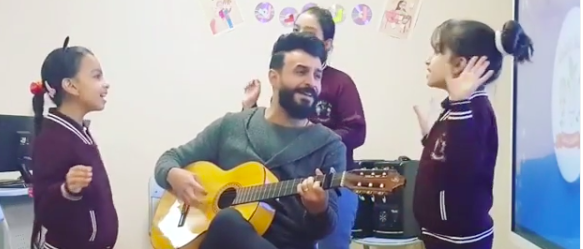Music can help children under war, exactly as it did with them in Iraq
The moment you enter into this class; everything around you will become totally unnoticed. Although the walls of the class are not soundproof, you still cannot hear the sound of the bombings outside.
When you are in this class, you feel you are isolated from the disputes among politicians which have been exhausting Iraq since more than ten years.
What you will have inside this class is quite a unique experience!
The sound of the musical instruments played by 28-year-old Alaa al-Khalidi is louder than anything else, especially when accompanied with the singing of his students who impatiently wait for his class to begin and feel depressed when the bell rings announcing its end.
Today, Alaa has entered into a classroom at a community school in Baghdad, Iraq, to play guitar and sing altogether with his students.
This has been his dream since he was a little kid. “My passion for singing and playing music has started since I was a kindergarten student; but at that time, schools were not allocating time for music classes,” he told Tiny Hand.
Up till now, the Iraqi Government has not dedicated classes to teach music; the thing that led Alaa to give music lessons at a school in Baghdad, for free.
Of course he does so besides the music lessons he gives at several community schools.
“My music classes have tremendously helped a lot of students, especially the female students who used to suffer from some psychological problems. Giving them music lessons has made a huge difference in their lives,” Alaa added.
In addition, music classes have played a great role in helping elementary students at the earliest grades who had had fears about joining a school for the first time and who consequently used to “hate” it, in Alaa’s terms. “It was through music that I could help these students accept and like being at school,” he explained.
According to recent statistics, there are currently 2.5 million children in Iraq who need help to access education, including 775,000 internally displaced children residing in and out of camps.
Tour in Alaa’s Musical World

Probably you would have no chance to attend any of Alaa’s music classes, but you still can follow his account on Instagram and take a tour in his special musical world to watch him playing music and singing together with his students.
The Iraqi singer said he is keen on posting these videos to convey a very important message to his followers.
That is: “A school can become an attractive environment for students, one which they love and where they can positively unleash their energy and power.”
He posts his videos under the Arabic hashtag #Linasnaa_aljamal (in English Let’s_make_beauty). “This hashtag is a message to everyone who has the ability to take the initiative and make beauty out of his work and art in a country that is going through very tough times. It is a message to arouse hope that young people and children are truly capable of making and shaping the future the way they like and exactly as in their dreams!”
Alaa further pointed out that childhood in Iraq is suffering from negligence and is in need of both competent people and organizations to care for it.
Not only does Alaa give music lessons at schools and play music at orphanages, he has also produced two songs for children at his own expense.
One of the two songs addresses a sad child who has considerably suffered the woes of war and later received help to be enrolled in a school.
The other song is about the country of love, encouraging children to overwhelmingly love their own homeland.
Preparing each of the two songs, writing their lyrics, and composing their music have taken a lot of time, he said. “I devoted much time to these songs believing that as long as I am addressing children then my songs must have a purpose and convey an important message,” the Iraqi artist noted.
Finally, Alaa sent the following message to all Iraqis: “If your son or daughter has musical inclination, encourage and support him or her; and before doing so, discover his or her unspoken innate talents and work on cultivating them most appropriately!”
View this post on Instagram#القدسية_للوطن 🙏 #لنصنع_الجمال 💕
A post shared by علاء الخالدي || Alaa alkhalidi (@alaa.alk7alidi) on
Related Posts
Syrian sisters are using rap to send a message to the world
Hiba* and Rama* are normal sisters. They bicker, they talk over one another, they laugh at each other. But they’re also refugees. They’re activists. Oh, and they’re rappers….
September 11, 2022Autistic children are talented and creative. Lebanese “Jad” is an example
Although she is only seventeen years old, Lebanese girl Karla Bou Zeidan speaks about autism with the same intense passion as that of researchers who have spent years conducting studies about it….
September 4, 2022


